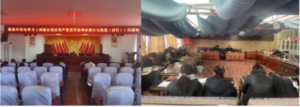
Study session on the Code of Conduct in progress in Tsamchu Village in Nagchu City on May 14 (left) and Yakra Township in Shigatse City on May 20 (right). Source: Chinese state media
The Chinese Communist Party (CCP) has issued a new six-point code of conduct in the Tibet Autonomous Region (TAR), the Code of Conduct for Communist Party Members in the Tibet Autonomous Region for Not Believing in Religion, which explicitly forbids party members from all forms of religiosity in both public and private life.
The International Campaign for Tibet says the code of conduct, which is currently being trialed, is significant for being perhaps the first party regulation that clearly and comprehensively details the specific types of religiosity forbidden for party members in the TAR. Examples of explicitly forbidden conduct include wearing rosary beads or religious imagery, forwarding or liking religious materials online and circumambulating mountains and lakes.
Party members are required to take an active role to propagate the party’s anti-religion stance by advising relatives to downplay their religious consciousness, not set up altars or hang religious imagery in homes and to seek party approval before inviting religious personnel to conduct rituals for customary occasions such as weddings and funerals.
ICT believes that the code of conduct is specifically aimed at Tibetan members of the CCP.
Chinese state media reports that study meetings are taking place in the TAR as part of the campaign to promote strict compliance to the code of conduct by party members. In addition, there are regulations which emphasise ideological conformity, discipline and political responsibility.
Although the code is said to apply throughout China, the code of conduct for the TAR appears to be unique, says ICT, as no equivalent code on religion is found for party members in other Chinese provinces and “autonomous” regions. East Turkestan [Ch: Xinjiang], with a Muslim majority, is the nearest comparable region to the Buddhist majority TAR; however, ICT has not found an equivalent code of conduct forbidding Islamic religiosity for party members in East Turkestan and suggests that this is a focus on Tibetan Buddhist religiosity to implement central party directives against religion and party building in the TAR.
ICT has translated the code as follows:
For party members:
- • Not wearing beads and statues on your body
• Not tattooing religious scriptures or signs on your body
• Not placing religious signs on office premises or official vehicles
• Not participating in group religious study and religious chanting
• Not donating money and materials to monasteries
• Not going for religious ritual visits, pilgrimage
• Not receiving ordination, making religious offerings
• No religious or spiritual retreats
• No circumambulation of mountains and lakes
• Not inviting monks and nuns and performing divination for family members or performing prayers or providing names to children
• No forwarding or liking religious audio, video, religious information or scriptures
• Not sending children to monasteries as monks and nuns, not sending them to places of religious worship or schools run by religious believers
• No to the 14th Dalai Lama
The obligations of Tibetan party members toward family members and society are:
- • Guide religious family members and relatives to downplay their religious consciousness
• Advise them not to set up altars, place religious objects or hang religious pictures or photos of religious personalities at home
• Advise family members and relatives not to participate in religious activities or do so as little as possible
• In case of customary activities (such as weddings and funerals) permission must be sought from the party branch before inviting religious personnel to carry out religious activities
• Promptly stop family members and close relatives on trips abroad from having audience with the 14th Dalai Lama or participate in various religious ceremonies and activities organised by the 14th Dalai Lama and the “Dalai clique.” Report to the party if they could not be stopped.
• Instruct the religious public to treat religion consciously, change their customs and reduce the influence of religion
Party leaders in the TAR demand strict compliance from Tibetan party members, who often face conflicts between their faith and party discipline. ICT says that Tibetans join the party for pragmatic reasons (such as for personal advancement), and to enable them to work within the regime to make a difference in the lives of their fellow Tibetans. They do not join out of a desire to overturn the Buddhist faith or erase Tibetan identity in their homeland.
* The International Campaign for Tibet is a non-profit advocacy group working to promote democratic freedoms for Tibetans, ensure their human rights, and protect Tibetan culture and the environment.




 Print
Print Email
Email